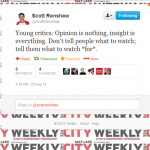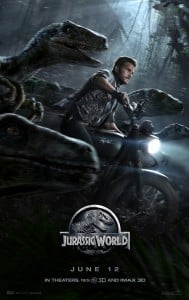 Today at Response, you can read my conversation with Edgar Wright, Simon Pegg, and Nick Frost, the three masterminds of Spaced, Shaun of the Dead, Hot Fuzz, and today’s sci-fi/comedy extravaganza, The World’s End.
Today at Response, you can read my conversation with Edgar Wright, Simon Pegg, and Nick Frost, the three masterminds of Spaced, Shaun of the Dead, Hot Fuzz, and today’s sci-fi/comedy extravaganza, The World’s End.
And by the way, I loved the movie.
But don’t just take my word for it.
Check out the reviews from some of the critics I respect most…
It will no doubt strike many as odd that what I claim as the year’s most virtuosic and consistently entertaining movie comedy also happens to be an action-packed tribute to a very British strain of anachronistic science fiction. It may seem odder too that I claim this self-same movie boasts the most delightfully literary script of any that’s unspooled across a cinema screen this year. But the exquisite execution of such unusual entertainment feats happens to be the specialty of director and writer Edgar Wright, who, here reunited with his frequent leading man and co-writer Simon Pegg, presents the most delightfully and sensibly eccentric mainstream picture I’ve seen in some time, “The World’s End.”
 Scott Renshaw at Salt Lake City Weekly:
Scott Renshaw at Salt Lake City Weekly:
…more summer adventures need to be this gloriously, intelligently, affectionately, hilariously bonkers.
Josh Larsen at Larsen On Film:
For a comedy, The World’s End has some of the year’s best action sequences.
Mike D’Angelo at Las Vegas Weekly:
… [it] quickly becomes apparent to our heroes that there’s something slightly off about their hometown. If you don’t yet know what that entails, try to avoid finding out — just trust that Wright and Pegg (who co-wrote the script) achieve the same level of pop-culture hilarity as in their previous films, abetted in this case by a superb ensemble cast. (Paddy Considine and Eddie Marsan, who usually play intense dramatic roles, both turn out to have a flair for broad comedy.) You both can and can’t go home again, this movie insists, but the reasons why you can’t are stranger than you imagine.
Coming at the end of a summer at the movies that’s been apocalyptic in both theme and quality, The World’s End feels timely and refreshing. Wright and Pegg’s edge over their competition is the way they put spectacle in service of character, instead of the other way around. Nothing in their films happens just because it looks cool (although hot damn, it often does look cool, too). Everything is motivated by the story they’re telling and the ideas they’re expressing—in this case, a cautionary tale about how nostalgia can be more dangerous than body-snatchers.
If “The World’s End” were only a picture about childhood buddies on a bittersweet pub crawl, it might have still been some sort of minor classic, so sharply observed is every shot, cut, music cue, line and close-up. When the film takes a right turn into science fiction conspiracy thriller territory—invoking “Invasion of the Body Snatchers” as well as such Carpenter films as “The Fog” and “Prince of Darkness”—you might worry that it’s about to succumb to Gary’s biggest fear, and trade spiky if heedless individuality for a tiresome grab at commercial formula. (This is the third Wright film in which a dull and harmless small town plays proves a hotbed of slowly-creeping and highly secretive horror.) No worries: the sci-fi elements—which were hinted at in trailers, but which I’ll write around in this review and maybe revisit later in a spoiler-warning-bedecked blog post—are audaciously funny and inventively designed, and they’re always tied to the film’s concerns. Nothing, no matter how extravagant or surreal, is superfluous.
…… in an era in which mainstream movies not only lack rhythm but seem to have forgotten how to dance, this one’s briskness is inspiring. Its judgment is nearly unerring, and it has a sense of joy that’s rare. Like most genre films, “The World’s End” is working things through in an extremely broad way and having a grand time doing it, and its self-deprecating wit inoculates it against self-importance. The movie wears its themes on its sleeve and pins its symbols to its puffed-out rooster’s chest, swaggers about with a proud grin jabbing thumbs at itself, then walks into an open manhole. It’s magnificent.













